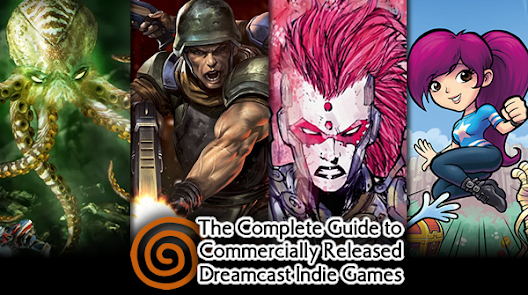We're quite lucky to be Dreamcast fans at the moment, living through what feels like a renaissance for the machine - with Sega giving a little bit of merchandise love to the machine, a proliferation of hardware mods that allow access to older titles, full HDMI support, new controllers, a growing collection of Dreamcast related literature, ports of Atomiswave arcade titles, and an ever impressive indie library. There's a remarkable amount of activity around a machine which is approaching 23 years of age, and we here at the Junkyard are embracing it with a smile on our face, a VMU in our pocket, and a dwindling bank account as we welcome the second coming of our digital dream box. And long may it continue!
The year 2021 is set to be the biggest - by some way - year for indie releases in the systems history though. There is a quite staggering number of titles on their way - more than 30 by some counts - and a fairly large number of those will be in our hands sooner, rather than later. Whilst most of you will have already backed the titles you've seen, there's a good chance some may have slipped you by, or maybe you've just not been aware of the tremendous indie barrage about to assault the console. Fear not, for we're hopefully going to set that straight today.
Before we list all the indie titles on their way, we want to make a couple of observations. This list only includes titles that are set for a physical release. That will preclude some of the homebrew software being developed, and of course won't touch on any ports being developed. We're also not going to include anything which is *only* based on rumours. As you can imagine, we have heard several of these! Furthermore, expect some *big* announcements of titles in the coming months - we can't say anything about them at the moment (we're such teases), but this article will be updated as new titles are announced!
On with the list!
Alice Sisters
Published by JoshProd - set for release early 2021
The first of numerous JoshProd titles in this list, Alice Sisters is a follow up to previous indie platformer Alice's Mom's Rescue, a quite charming little game from prolific previous indie developer Orion. Like the original, this appears to be a 2D platformer, but with the interesting addition of co-op mechanics. Each player guides one of the sisters (or a single player can switch between them) through a promised 28 stages, each using different abilities to combat the games puzzles. 4 game modes are also promised, and screenshots show a charming, colourful world, very much in the style of Orion's previous titles.

A DC release was hinted at in the summer of 2019, but little was revealed for this cross-platform release (a Steam and Mega Drive/Genesis release are also on the cards), but the trailer dropped by JoshProd in February 2021 has the game running and looking as charmingly fun as I hoped it would. I'm looking forward to this one, a proven developer, a genre we've not seen much of, and an intriguing co-op mode which could be very enjoyable indeed.
You can pre-order the PAL version here, the US version here and the Japanese version here. You can also download the PC version of the game from Orion's itch.io page here.
Andro Dunos
Published by JoshProd - set for release September 2021

Whilst Pixelheart /
JoshProd made a big deal about the release of a brand new sequel, going as far as
presenting a special event on Youtube for it's launch, the pending
release of the original Andro
Dunos went a little under the radar. It's perhaps not surprising
though that this early 90's
horizontal shooter is making it's way to the Dreamcast. It'd been
rumoured for months, the acquisition of Visco's library by the
publishers made it an obvious choice, and for many DC players,
they've been enjoying the game via emulation for some time anyway. A
decent, colourful example of the genre, it's become a minor cult
favourite with some fans, and certainly won't be out of place in the
plentiful supply of indie shooters the system is home too. There are
possibly a few issues regarding how the emulation (presuming it will
be played via emulation, like other Neo Geo ports from JoshProd) will
work, and it's own sequel is now taking much of the attention away
from this release, but it's a welcome addition to the library.

You can pre-order the PAL version here, the US version here and the Japanese version here.



















































